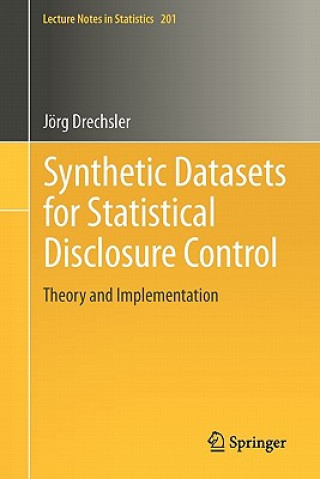
Kód: 01426738
Synthetic Datasets for Statistical Disclosure Control
Autor Jörg Drechsler
The aim of this book is to give the reader a detailed introduction to the different approaches to generating multiply imputed synthetic datasets. It describes all approaches that have been developed so far, provides a brief histor ... celý popis
- Jazyk:
 Angličtina
Angličtina - Vazba: Brožovaná
- Počet stran: 138
Nakladatelství: Springer-Verlag New York Inc., 2011
- Více informací o knize

3907 Kč

Skladem u dodavatele v malém množství
Odesíláme za 12-17 dnů
Potřebujete více kusů?Máte-li zájem o více kusů, prověřte, prosím, nejprve dostupnost titulu na naši zákaznické podpoře.
Přidat mezi přání
Mohlo by se vám také líbit
-

Third Industrial Revolution
473 Kč -

Extensions of First-Order Logic
2530 Kč -

God of Philosophy
1550 Kč -

Rum Affair
558 Kč -

Beyond Valor
568 Kč -

Catalogue of Late Roman Coins in the Dumbarton Oaks Collection and in the Whittemore Collection: From Arcadius and Honorius to the Accession of Ana
2833 Kč -

Historisch-politische Aufsätze und Reden
1057 Kč
Darujte tuto knihu ještě dnes
- Objednejte knihu a zvolte Zaslat jako dárek.
- Obratem obdržíte darovací poukaz na knihu, který můžete ihned předat obdarovanému.
- Knihu zašleme na adresu obdarovaného, o nic se nestaráte.
Více informací o knize Synthetic Datasets for Statistical Disclosure Control
Nákupem získáte 391 bodů
 Anotace knihy
Anotace knihy
The aim of this book is to give the reader a detailed introduction to the different approaches to generating multiply imputed synthetic datasets. It describes all approaches that have been developed so far, provides a brief history of synthetic datasets, and gives useful hints on how to deal with real data problems like nonresponse, skip patterns, or logical constraints. Each chapter is dedicated to one approach, first describing the general concept followed by a detailed application to a real dataset providing useful guidelines on how to implement the theory in practice. The discussed multiple imputation approaches include imputation for nonresponse, generating fully synthetic datasets, generating partially synthetic datasets, generating synthetic datasets when the original data is subject to nonresponse, and a two-stage imputation approach that helps to better address the omnipresent trade-off between analytical validity and the risk of disclosure.§The book concludes with a glimpse into the future of synthetic datasets, discussing the potential benefits and possible obstacles of the approach and ways to address the concerns of data users and their understandable discomfort with using data that doesn t consist only of the originally collected values. §The book is intended for researchers and practitioners alike. It helps the researcher to find the state of the art in synthetic data summarized in one book with full reference to all relevant papers on the topic. But it is also useful for the practitioner at the statistical agency who is considering the synthetic data approach for data dissemination in the future and wants to get familiar with the topic.§Each chapter is dedicated to one approach, first describing the general concept followed by a detailed application to a real dataset providing useful guidelines on how to implement the theory in practice. The discussed multiple imputation approaches include imputation for nonresponse, generating fully synthetic datasets, generating partially synthetic datasets, generating synthetic datasets when the original data is subject to nonresponse, and a two-stage imputation approach that helps to better address the omnipresent trade-off between analytical validity and the risk of disclosure.§The book concludes with a glimpse into the future of synthetic datasets, discussing the potential benefits and possible obstacles of the approach and ways to address the concerns of data users and their understandable discomfort with using data that doesn t consist only of the originally collected values. §The book is intended for researchers and practitioners alike. It helps the researcher to find the state of the art in synthetic data summarized in one book with full reference to all relevant papers on the topic. But it is also useful for the practitioner at the statistical agency who is considering the synthetic data approach for data dissemination in the future and wants to get familiar with the topic.§The discussed multiple imputation approaches include imputation for nonresponse, generating fully synthetic datasets, generating partially synthetic datasets, generating synthetic datasets when the original data is subject to nonresponse, and a two-stage imputation approach that helps to better address the omnipresent trade-off between analytical validity and the risk of disclosure.§The book concludes with a glimpse into the future of synthetic datasets, discussing the potential benefits and possible obstacles of the approach and ways to address the concerns of data users and their understandable discomfort with using data that doesn t consist only of the originally collected values. §The book is intended for researchers and practitioners alike. It helps the researcher to find the state of the art in synthetic data summarized in one book with full reference to all relevant papers on the topic. But it is also useful for the practitioner at the statistical agency who is considering the synthThe aim of this book is to give the reader a detailed introduction to the different approaches to generating multiply imputed synthetic datasets. It describes all approaches that have been developed so far, provides a brief history of synthetic datasets, and gives useful hints on how to deal with real data problems like nonresponse, skip patterns, or logical constraints. Each chapter is dedicated to one approach, first describing the general concept followed by a detailed application to a real dataset providing useful guidelines on how to implement the theory in practice. The discussed multiple imputation approaches include imputation for nonresponse, generating fully synthetic datasets, generating partially synthetic datasets, generating synthetic datasets when the original data is subject to nonresponse, and a two-stage imputation approach that helps to better address the omnipresent trade-off between analytical validity and the risk of disclosure.§The book concludes with a glimpse into the future of synthetic datasets, discussing the potential benefits and possible obstacles of the approach and ways to address the concerns of data users and their understandable discomfort with using data that doesn t consist only of the originally collected values. §The book is intended for researchers and practitioners alike. It helps the researcher to find the state of the art in synthetic data summarized in one book with full reference to all relevant papers on the topic. But it is also useful for the practitioner at the statistical agency who is considering the synthetic data approach for data dissemination in the future and wants to get familiar with the topic.The aim of this book is to give the reader a detailed introduction to the different approaches to generating multiply imputed synthetic datasets. It describes all approaches that have been developed so far, provides a brief history of synthetic datasets, and gives useful hints on how to deal with real data problems like nonresponse, skip patterns, or logical constraints. §Each chapter is dedicated to one approach, first describing the general concept followed by a detailed application to a real dataset providing useful guidelines on how to implement the theory in practice. §The discussed multiple imputation approaches include imputation for nonresponse, generating fully synthetic datasets, generating partially synthetic datasets, generating synthetic datasets when the original data is subject to nonresponse, and a two-stage imputation approach that helps to better address the omnipresent trade-off between analytical validity and the risk of disclosure.§The book concludes with a glimpse into the future of synthetic datasets, discussing the potential benefits and possible obstacles of the approach and ways to address the concerns of data users and their understandable discomfort with using data that doesn t consist only of the originally collected values. §The book is intended for researchers and practitioners alike. It helps the researcher to find the state of the art in synthetic data summarized in one book with full reference to all relevant papers on the topic. But it is also useful for the practitioner at the statistical agency who is considering the synthetic data approach for data dissemination in the future and wants to get familiar with the topic.
 Parametry knihy
Parametry knihy
Zařazení knihy Knihy v angličtině Society & social sciences Sociology & anthropology Sociology
3907 Kč
- Plný název: Synthetic Datasets for Statistical Disclosure Control
- Podnázev: Theory and Implementation
- Autor: Jörg Drechsler
- Jazyk:
 Angličtina
Angličtina - Vazba: Brožovaná
- Počet stran: 138
- EAN: 9781461403258
- ISBN: 1461403251
- ID: 01426738
- Nakladatelství: Springer-Verlag New York Inc.
- Hmotnost: 254 g
- Rozměry: 235 × 155 × 15 mm
- Datum vydání: 26. June 2011
Oblíbené z jiného soudku
-

Sex at Dawn
368 Kč -

Death and the Afterlife
453 Kč -

Cartoon Guide to Statistics
468 Kč -

Why Love Hurts - A Sociological Explanation
438 Kč -

Past Mortems
250 Kč -

Basic and Advanced Focus Groups
1065 Kč -

Fair Play Deck
479 Kč -

Intimate Communion
321 Kč -

Tragedy and Hope
1121 Kč -

Small Is Beautiful
276 Kč -

More Than Two
605 Kč -

Regretting Motherhood
348 Kč -

Social Intelligence
357 Kč -

True Believer
329 Kč -

Art of Community: Seven Principles for Belonging
482 Kč -

NINETY PERCENT OF EVERYTHING
420 Kč -

Reassembling the Social
1120 Kč -

Family and Civilization
538 Kč -

Book of Tea
250 Kč -

Building and Dwelling
410 Kč -

Constructing Grounded Theory
1249 Kč -

Surrendered Wife
276 Kč -

Of Woman Born
378 Kč -

Cruel Optimism
748 Kč -

Death and the Afterlife
802 Kč -

What Kinship Is-And Is Not
481 Kč -

Social History of Sexual Relations in Iran
1426 Kč -

Post-Adoption Blues
438 Kč -

Dissecting the Danchi
3611 Kč -

Birth Of A Mother
551 Kč -

New Old Fashioned Ways
449 Kč -

Platform Society
1004 Kč -

Death Tourism
1006 Kč -

Secret Meaning of Money - How to Prevent Financial Problems from Destroying Our Most Intimate Relationships
982 Kč -

Braving the Wilderness
234 Kč -

Eroticism
303 Kč -

Marriage, a History
464 Kč -

Bushido the Soul of Japan
288 Kč -

Intercourse
384 Kč -

Ideology and Utopia
454 Kč -

Population Control
357 Kč -

Class Ceiling
324 Kč -

Chrysanthemum and the Sword
439 Kč -

Smoke Gets in Your Eyes
286 Kč -

Sociology: A Very Short Introduction
250 Kč -

Being Mortal
296 Kč -

Theory of the Leisure Class
303 Kč -

Social Construction of Reality
303 Kč -

Bushido: The Soul Of Japan
432 Kč
Osobní odběr Praha, Brno a 12903 dalších
Copyright ©2008-24 nejlevnejsi-knihy.cz Všechna práva vyhrazenaSoukromíCookies


 Vrácení do měsíce
Vrácení do měsíce 571 999 099 (8-15.30h)
571 999 099 (8-15.30h)